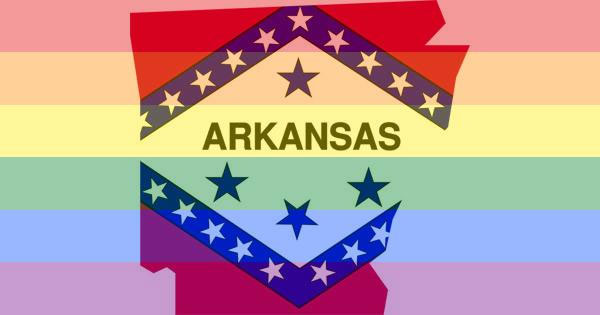
I am proud of my home state of Arkansas this week. Not just because a circuit judge rightly ruled the state’s ban on same-sex marriages unconstitutional, a pleasing albeit perhaps temporary victory.
No, I’m proud because even against a majority that seems to be against same-sex marriage, the state now has an attorney general who supports the right to marry for all, and is only defending the state’s ban out of professional obligation. I’m proud because my hometown courthouse in Fayetteville’s Washington County is gleefully still issuing licenses to same-sex couples despite the threat of a stay or appeal.
And I’m proud that, even if an appeal ends up keeping same-sex marriage illegal in Arkansas, the momentum is clearly heading in favor of marriage equality. Dozens of couples have received licenses the past few days, and Arkansans of all stripes have joyfully cheered them on. I have personally waited a long time to see this. Gay marriage is headed to God’s heartland.
The picture did not always look so promising. I was there 16 years ago when the issue of gay rights first officially arrived in Northwest Arkansas, a 22-year-old reporter for the Fayetteville newspaper and recovering fundamentalist. A plucky young alderman proposed before the Fayetteville City Council the Human Dignity Resolution, a nonbinding (except on the city) resolution that urged nondiscrimination in hiring and firing, including over matters of sexual orientation.
You’d have thought he set off a big gay bomb. Scores of bigoted residents came to the council meetings to spew the worst hate I had ever heard. A flier went out on doors showing a leg stepping through a threshold and warning the resolution would present a “foot in the door,” hyperventilating on doorknobs that the city might become “San Fran-Fayetteville.” A beloved TV personality actually made a slick commercial suggesting that this simple nondiscrimination policy would “tear down” the diversity of the city (it made no sense then, either).
Later, after I became editorial page editor, I advocated for gay rights and same-sex marriage repeatedly, earning scornful letters to the editor and a few threatening phone calls, including one from a man who said I should “get out of town” and “go to San Francisco” where I’d be a “big hit at the bath houses.”
Eventually, my advocacy cost me my job. In 2003, I was told the ownership of the paper at the time (which included one of the Wal-Mart heirs) was increasingly uncomfortable with my causes, including repeated clashes with a powerful local mega church pastor who had made Islamophobia and homophobia the cornerstone of his recent, nationally televised sermons. By that point I was ready to pursue the classics and graduate school, so I gladly accepted a part-time position editing copy, but kept writing columns. My final evaluation remarked that I spent “too much time on the gay issue.”
Gay rights, including marriage equality, are the civil rights fight of our generation. That’s why I wrote so much about it then, and why I continue to do so now. While racial discrimination and prejudice against gays are not perfectly equivalent, they share in common the fact that a powerful majority is hell-bent on denying a group of people the same rights and privileges they themselves enjoy, for no better reason than tradition. Sure, there are rationalizations now as there were then, but they all fail the tests of reason and evidence, which is why more and more judges are striking these laws down.
Many have seen Arkansas’ role in the Civil Rights clashes of yesteryear resurfacing in this fight, and rightly so. In 1957, a group of black students attempted to attend school at Central High School in Little Rock, Ark. (the so-called Little Rock Nine). Every year it is commemorated by the state newspaper, which almost always shows the now-iconic picture of a young girl, Hazel Massery, her face twisted in anger, shouting hatred at one of the black young women, Elizabeth Eckford, walking by her. And almost every year, it is accompanied by a where-are-they-now story, in which Massery usually expresses remorse and shame for her bigotry, burned into unforgettable history.
In the coming weeks, Arkansas faces just such a crossroads. There are people responding to this whose words and actions will, inevitably, be frozen for future generations, just as Massery’s were. As the state moves forward on the issue of same-sex marriage, its residents should try to remember the long view of history, and bravely embrace today’s pride over tomorrow’s shame.
 About Don M. Burrows
About Don M. Burrows
Don M. Burrows is a former journalist and current college preparatory school teacher. Don holds a Ph.D. in Classical Studies from the University of Minnesota. A former Christian fundamentalist, Don is now a member of the United Church of Christ and contends most firmly that the Bible cannot be read or explored without appreciating its ancient, historical context. Don lives in Minneapolis with his wife and two young children. Don blogs at Nota Bene and can also be found on Facebook.
Leave a Reply